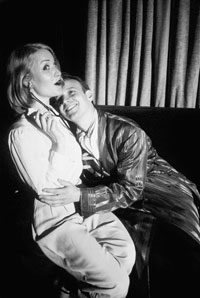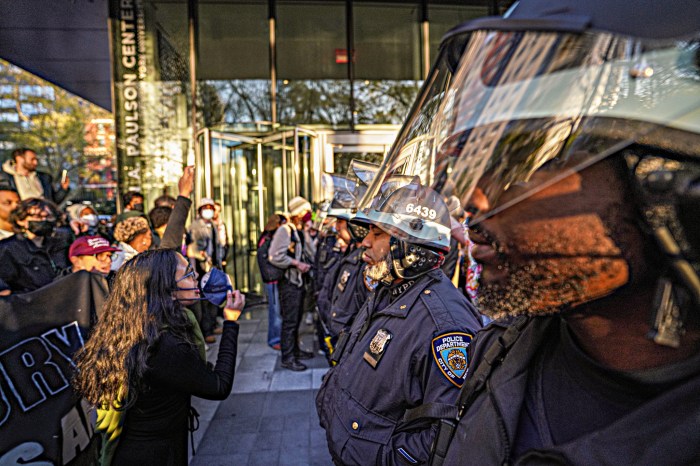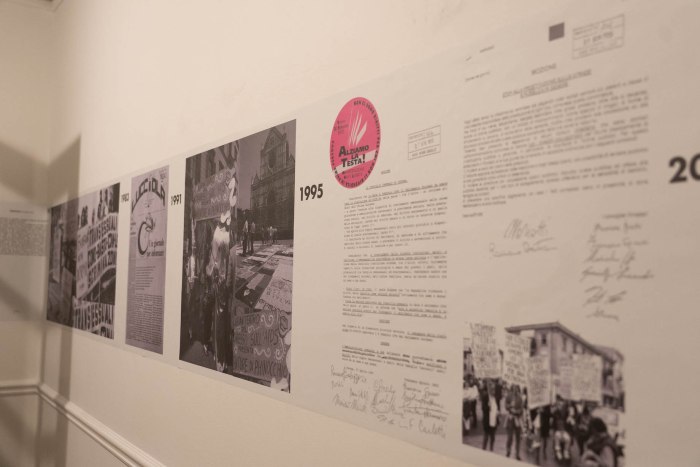By JERRY TALLMER
You wouldn’t think that a serious young director like Carl Forsman could go for a silly-ass play like P. G. Wodehouse’s “Good Morning, Bill” — and you’d be wrong.
You might also be wrong about the play. There are silly asses in it, one or two, including the Bill Paradene of the title, a youngish member of Britain’s idle rich (well, he does a spot of farming) who falls at first sight, like a ton of bricks, for a thoroughly no-nonsense M.D. who just happens to be a smashing looker. Her name is Sally Smith, and she treats Bill like the ninny he is — until, of course, much to Sally’s surprise, love conquers all.
The last time around, Forsman and his Keen Company were stylishly revisiting “Museum,” Tina Howe’s pointed satire of artsiness, and the time before that Forsman brought in a letter-perfect loving re-creation of John van Druten’s forever-young World War II romance, “The Voice of the Turtle.”
And now, Wodehouse? With a comedy in which someone named Tidmouth — actually Lord Tidmouth — is nicknamed Squiffy, and says things like “Right ho” and “Oh, rather” and “Listen, old boy. The amount of love I’ve had in the last 10 years, if placed end to end, would reach from London to Paris”?
But languid Tidmouth/Squiffy isn’t the, so to speak, hero of the piece. In fact Bill Paradene isn’t the hero of the piece either. He’s the exemplar of puppy love. If anyone’s the hero, it has to be Sally Smith, M.D., whose contempt for the idle rich, or the idle anything, is only matched by her pride of profession and her skill and dedication to it.
Which is the point of the play, and the prime reason Carl Forsman wanted to do “Good Morning, Bill,” which starts performances Sept. 19 for a stand through Oct. 12 at the Connelly Theater, 220 East 4th Street.
Pelham Grenville Wodehouse (1881-1975) wrote “Good Morning, Bill” in 1926. In truth he adapted it from a play written some years earlier by Laszlo Fodor of Hungary. Wodehouse was rather good at adapting from the Hungarian; a more famous work he put his hand to was “The Play’s the Thing” — the Ferenc Molnar drama that in 1985 Tom Stoppard would brilliantly pack off to sea on an ocean liner as “Rough Crossing.”
Around four years ago, Forsman came across a Methuen collection of four plays by Wodehouse, who didn’t write a great many plays altogether, though the Englishman’s prodigious other output included 92 novels, countless letters, lyrics, etc.
“I was totally ignorant of Wodehouse’s work,” says Forsman. “I’d heard of it. I hadn’t read any. Now I read through all four plays on a lark, and fell pretty hard for this one. Even on the page I knew it was rhythmically impeccable, and strongly in the tradition of Wilde and Coward, though I know that’s risky to say. But it’s so structurally tight, and Wodehouse is such an effortless writer.
“When he was doing adaptations like this, they’d just send him, not the whole original, but a one- or two-page outline, and he’d work from that.
“Laszlo Fodor’s interesting too. He was a great feminist, and he wrote this piece explicitly to champion women’s right to work. Another play of his, ‘The Church Mouse,’ centers on a very attractive stenographer caught up in goings on at the Vienna bank where she works.”
If “Good Morning, Bill” had been made into a movie in the 1940s, a sharp casting choice for Sally Smith, M.D., would have been Rosalind Russell.
“Sally was one of the things that attracted me to the play,” says Forsman. “A pre-modern, independent-minded woman. When ‘Good Morning, Bill’ was written there were fewer than 300 women doctors in all of Great Britain. It was like writing a play abut an astronaut — literally a pioneer.”
In counterpoise here to Dr. Smith is a young woman known only as Lottie, who keeps flinging herself at Bill Paradene’s head and other dimensions. “The ultimate sex symbol,” says director Forsman. “A loose-living modern girl whose liberation was sexual and social but not economic.”
Sally is played by Heidi Armbruster, who comes to New York (her debut here) from A.C.T in San Francisco. Lottie is played by Bridget Ann White. Bill is played by Jeremiah Wiggins. John Vennema plays the huffing, puffing Uncle Hugo, a golf addict (“my dad was a golfer,” says Forsman), and Nick Toren, who was so fine as Sgt. Bill Page in “The Voice of the Turtle,” here steps into the far more ungallant role of Tidmouth.
“Wodehouse was a master of character, tossing up classic archetypes like Jeeves, Bertie Wooster, and Psmith that still speak to people. Psmith — the ‘p’ is silent as in pshrimp — appears in a Wodehouse series of schoolboy books.”
To Forsman, Tidmouth is essentially teenager Psmith a few years farther on: “Very dry, very funny, somewhat inscrutable, a bit of a slacker. Never runs under any circumstance. Firm believer in the value of sleep and drink.”
And Bill Paradene?
“He’s got a little of Bertie Wooster in him. Hapless, somewhat lost, directionless, very lonely. Remember, Wodehouse himself was sent back to England, as if orphaned at age 3, to be raised by a series of aunts and uncles. At age 9 he knew he’d be a writer. Lived in a world that didn’t exist except as Edwardian echoes.”
That world came smack up against the real world during World War II, when Wodehouse, taken prisoner by the Germans from his house at Le Touquet, outside Paris, subsequently did a series of five light-hearted broadcasts from Berlin on what life was like in a POW camp. For this he was, for a period, back home, widely and roundly blasted as a collaborator and worse.
“I’ve read them, those broadcasts” says Forsman. “They are not pro-German by any description. He was writing seriously about life in a POW camp. It’s very ‘Hogan’s Heroes.’ And after the war he was knighted; he’s Sir P.G. Wodehouse.”
For all that, there are some people who still don’t have much stomach for ‘Hogan’s Heroes,’ and never did, but let it go.
What ultimately clinched Forsman’s desire to do this play was the moment at Act I curtain when Bill Paradene, rebuffed by Dr. Sally Smith (“Go in for sport and the open air. Dine early and lightly and before going to bed take a three-mile walk. It’ll make you sleep well. Goodbye.”), stands staring at a childhood rocking horse.
“Wodehouse was not known for the emotional availability of his prose,” says the director. “But did you know he wrote the lyrics of ‘Just my Bill,’ that song from ‘Showboat’? There’s a simple yet real emotional presence in this [rocking-horse] moment — childish but appealing. That’s what gives it resonance.
“Love is about respect. Romance is a little absurd,” says the 32-year-old Carl Forsman who, as it happens, lately broke up with his girlfriend. “Romance is a little absurd, but friendship and respect are real.”
Mama, mama, I feel sick. Send for the doctor, quick, quick, quick.


















